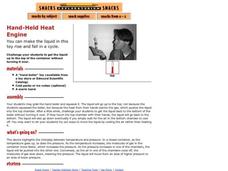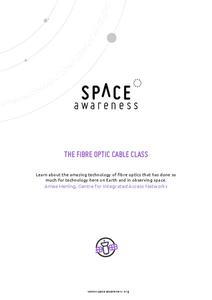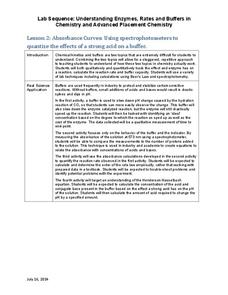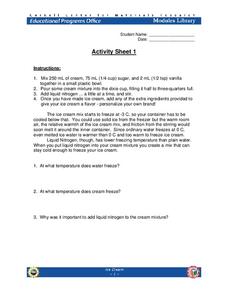Center for Learning in Action
Properties of Balls
Enhance your states of matter lessons with a hands-on science investigation that compares six different balls' color, texture, size, weight, ability to bounce, and buoyancy.
Curated OER
Plate Tectonics: First Grade Lesson Plans and Activities
A set of first grade geology lessons focuses on plate tectonics and movement of plate boundaries. During the pre-lab, learners experience three types of plate movement through a kinesthetic demonstration. The lab...
Curated OER
Plate Tectonics: Fourth Grade Lesson Plans and Activities
The pre-lab portion of the lesson introduces emerging geologists to the various layers that make up Earth. After completing a sheet on the identification of the layers, class members simulate plate boundaries and their...
Minnesota Department of Natural Resoures
Getting to Know Trees
Celebrate the beauty of trees with a packet full of activities designed to help kindergarteners get to know about their leafy nature friends. Covering a variety of subjects, scholars go on a nature hike, read Shel Silverstein's The...
Houghton Mifflin Harcourt
Nature: Friend and Foe: Challenge Activities (Theme 6)
The teacher doesn't always have to be the expert in the classroom. The first in a series of three supplementary activities Nature: Friend or Foe uses hands-on research tasks and projects to enhance readers' understanding of non-fiction...
Exploratorium
Hand-Held Heat Engine
See the direct relationship between pressure and temperature using these classic science toys. As individuals hold the glass bulb, the liquid inside reaches it's boiling temperature, which is just a bit above room temperature. As the...
Space Awareness
The Fibre Optic Cable Class
Many people know that fiber optics are used in delivering the Internet, but are surprised to learn they are also used in astronomy. Scholars explore light, reflection, and fiber optics through hands-on activities. They discuss...
Curated OER
Exploring Electricity - Four Activities
These are four classic activities used for instructing upper elementary electricians. The first involves experimenting with the Van de Graaff generator. The second is a series of hands-on experiences with static. In the third activity,...
CK-12 Foundation
Location and Direction: Angle from the Equator
From any angle, this interactive is helpful. Earth science super stars explore a location's angle from the equator through a hands-on activity. Questions guide learners as they test their knowledge of direction and geometry used in...
Curated OER
Earthquakes: Second Grade Lesson Plans and Activities
What causes earthquakes? Second graders learn about stresses from plate movement with a set of hands-on activities. After tracing fault lines on a map with yarn, class members create a paper plate model of Earth to show its layers...
Howard Hughes Medical Institute
Understanding Variation
Does where we live influence how our bodies express genetic traits? Explore variation in human skin color with an activity that incorporate video and hands-on learning. Individuals model the relationship between phenotypes and genotypes,...
Kenan Fellows
Absorbance Curves: Using Spectrophotometers to Quantize the Effects of a Strong Acid on a Buffer
The Henderson-Hasselbalch equation combined logarithmic terms with the application of carbonic acid as a buffer solution. Scholars learn investigate equation and its applications through hands-on experiments. They collect data and...
Curated OER
Plate Tectonics: Third Grade Lesson Plans and Activities
Third graders examine plate movements and boundaries with a lab that demonstrates how volcanoes and earthquakes are formed. It presents different types of stresses an object can withstand through a hands-on...
NOAA
I Didn’t Do It…Did I?: Make Your Own Greenhouse Effect
How do greenhouse gases affect the climate on Earth? Pupils explore the concept by first building their own apparatuses to model the greenhouse effect. Then, they record data to measure temperature change and determine...
Cornell University
Isotopes
What better way is there to learn about isotopes than to play with them? Chemistry students manipulate the number of protons and neutrons in a hands-on activity. Individuals try to score the largest number of points...
Purdue University
Chirp! Chirp!
If you build it, they will come. Young scholars learn about local birds in an interesting hands-on instructional activity. They begin by identifying birds either from photos or in nature and then build their own bird feeders. The...
Purdue University
Design of Music Instruments for a Rock Band
Can you create a rock band? Scholars learn about the creation and transmission of sound in a hands-on STEM activity. First, they explore the transmission of sound using a tuning fork. Then, they must solve the problem of missing...
Purdue University
Plastic Water Bottle Design – What’s the Best Shape?
Join the fight to reduce plastic waste. A hands-on STEM activity first teaches scholars about the scourge of plastic waste. They then measure the dimensions of water bottles to calculate surface areas and volumes before using the surface...
Perkins School for the Blind
Building an Organic Molecule
Glucose is a simple sugar and a molecule that can be illustrated through modeling. Scientific investigators with visual impairments use hands-on models to reconstruct the process of bonding molecules. The tools used in this activity are...
Purdue University
Field Trip Snack Holder
Is light related to insulation? An informative hands-on STEM activity demonstrates how light affects temperature. First, the class investigates how light passes through different mediums and how that relates to temperature. Then,...
Community Resources for Science
"5 E's" Science Planning Worksheet
This two-page planning guide walks you through a five-part process for teaching scientific content. To begin, decide how you will evaluate learners' progress, then what tools you will use to engage them in the topic. Plan how they will...
Scholastic
Acceleration Nation Guide
Discover the science of NASCAR! Young scholars rev up their learning as they explore aerodynamic principles. Hands-on activities help learners understand concepts of friction, kinetic energy, and potential energy.
PBS
Blow the Roof Off!
Blow the minds of young scientists with this collection of inquiry-based investigations. Based on a series of eight videos, these "hands-on, minds-on" science lessons engage young learners in exploring a wide range of topics...
Museum of Science
Paddle Boat
Harness the power of rubber bands of all things. A hands-on activity has scholars design and build paddle boats. They learn how the elastic potential energy of rubber bands can be converted to the kinetic energy associated with motion.

























